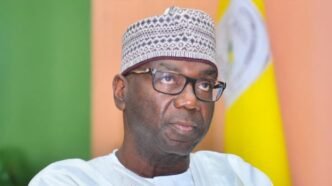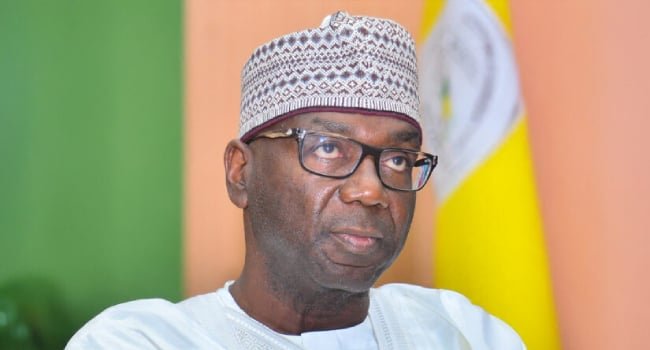Kwara State Governor, AbdulRahman AbdulRazaq, has called for urgent reinforcement of security personnel in the Ekiti Local Government Area following a fresh wave of armed attacks that shook the community on Tuesday. The call was made public in an official government statement signed on Wednesday by the Governor’s Chief Press Secretary, Rafiu Ajakaye, amid growing concern for the safety of residents in the Eruku axis and surrounding areas.
The renewed security concern underscores the rising challenges of banditry, kidnapping, cross-border criminal operations, and rural insecurity affecting several northern and central states in Nigeria. Ekiti Local Government, especially towns along the Kwara–Kogi axis, has in recent years found itself on the front line of these threats, with periodic attacks forcing local authorities and security agencies to reevaluate operational strategies.
According to the statement released by the Governor’s media office, AbdulRazaq has called for the deployment of additional security personnel to complement existing operatives already stationed in the affected region, stressing that immediate action is necessary to restore public confidence and prevent further incidents.
“The Governor has sought immediate deployment of more security operatives to support the existing security architecture in the area. He requested that this new measure be activated immediately,” the statement read.
Growing Tension in Eruku and Surrounding Communities
Eruku and neighboring communities have long been vulnerable to criminal elements who exploit the state’s boundary with Kogi to move weapons, conduct raids, or escape arrest. Residents of border towns often face long stretches of unguarded forest routes, sparse security infrastructure, and limited communication networks—conditions that make policing and early warning difficult.
Although full details of the most recent attack remain limited at press time, the situation has been described as serious enough to trigger immediate government intervention. Reports from the area suggest that fears among residents have heightened, with communities calling for stronger proactive security measures rather than reactive deployments after each attack.
Local community leaders have consistently warned that unless sustained action is taken—including expanded patrols, rural surveillance technology, and joint operations with neighboring states—the region could face repeated incidents capable of overwhelming civilians and existing security structures.
Kwara Government’s Rapid Response Strategy
The latest directive from Governor AbdulRazaq is consistent with the state’s ongoing emphasis on speed and responsiveness in matters of security. Since assuming office, the administration has repeatedly pledged to partner closely with federal agencies such as the Army, Department of State Services (DSS), Nigeria Security and Civil Defence Corps (NSCDC), and the Police to safeguard vulnerable areas, especially rural border communities.
Kwara State’s security strategy has often focused on:
- Immediate reinforcement and deployment when attacks occur
- Improved communication channels between communities and law enforcement
- Collaboration with military and intelligence units
- Strengthening of community policing initiatives
- Support to hunters, vigilantes, and local intelligence networks operating legally
The Governor’s latest call reinforces the state’s message that persistent attacks will not be allowed to become normalized.
Implications for Residents and Rural Development
Security concerns in Ekiti Local Government Area have ripple effects that go beyond the immediate threat of violence. Rural insecurity often disrupts economic activities, agricultural production, transportation, and market access. For a community heavily dependent on farming and cross-regional trade, instability creates a chain reaction:
- Farmers avoid farmlands for fear of attacks
- Business owners slow down operations
- Night-time movement becomes restricted
- Schools and health services may experience lower attendance
- Investors and development partners may hesitate to channel resources to the area
Local residents have repeatedly appealed for stronger protection, noting that their areas are rich in potential but limited by safety challenges.
The Kwara State Government’s latest intervention signals its commitment to preventing a breakdown of economic and social activities in the region.
A Border Region Under Pressure
One of the major operational challenges in areas like Eruku is geography. Border regions across Nigeria have become hubs of criminal movements, largely due to:
- Forested cross-state escape routes
- Long distances between security outposts
- Limited surveillance equipment
- Rural population densities that make early alerts difficult
Criminal groups operating across Kwara and Kogi are known to exploit these vulnerabilities, often carrying out attacks and then retreating back across borders before security forces are able to intercept them.
Security analysts have also pointed out that many border communities in Nigeria require:
- Monitoring via drones or aerial patrol
- Permanent operational bases
- Night-vision capable units
- Community-driven early alert systems
- Crime data sharing between neighboring states
Without modernized tools, traditional security deployment alone is often stretched thin across large unprotected territories.
Immediate Measures Expected
Although the statement from the Governor did not disclose operational specifics such as troop numbers, agency composition, or deployment timeline, affected communities are expecting quick measurable action, especially since the directive specifically stated that the measures must be activated “immediately.”
Typical reinforcement patterns in such situations may include:
- Increasing the number of military patrol units
- Deploying mobile police squadrons
- Strengthening joint task force operations
- Repositioning NSCDC officers for border surveillance
- Supporting intelligence officers and informants at community level
The success of the operation will ultimately depend on coordination, timely intelligence gathering, and continuous presence rather than one-off responses.
Public Confidence and Government Accountability
The Kwara State Government understands that public confidence is critical during periods of insecurity. Affected residents depend on visible security presence to maintain faith in government systems. Statements from the Governor’s office are therefore both operational and psychological—meant to reassure communities that government is not ignoring the situation.
For many citizens in Eruku and nearby areas, the hope is that this is not just a temporary response but the beginning of a more robust long-term approach.
What This Means for Security Strategy in Kwara
The ongoing situation offers several takeaways for broader security planning in Kwara:
- Rural and border communities remain key pressure points.
Criminal networks exploit terrain and weak inter-state surveillance. - Rapid deployment remains essential.
Slow response time leads to higher casualties and property loss. - Technology and intelligence are needed.
Patrols alone cannot provide total coverage across forest routes. - Community participation is necessary.
Hunters, vigilantes, and local informants continue to be vital eyes on the ground. - Collaboration between states is crucial.
Criminality across Kwara’s borders cannot be solved in isolation.
The Governor’s swift response aligns with these realities, sending a message that protecting rural communities remains a top administrative priority.
Conclusion
Governor AbdulRahman AbdulRazaq’s call for immediate reinforcement of security operatives in Ekiti Local Government Area reflects growing concern over a fresh wave of attacks threatening the peace and stability of the region. With the Eruku axis sitting on a strategic yet vulnerable border route, sustained security presence is essential to protect residents, restore confidence, and prevent recurring violence.
As new deployments move into the area, communities await results—hoping that a stronger, coordinated approach will finally halt the cycle of attacks and create a safer environment for business, education, farming, and everyday life in this important part of Kwara State.














